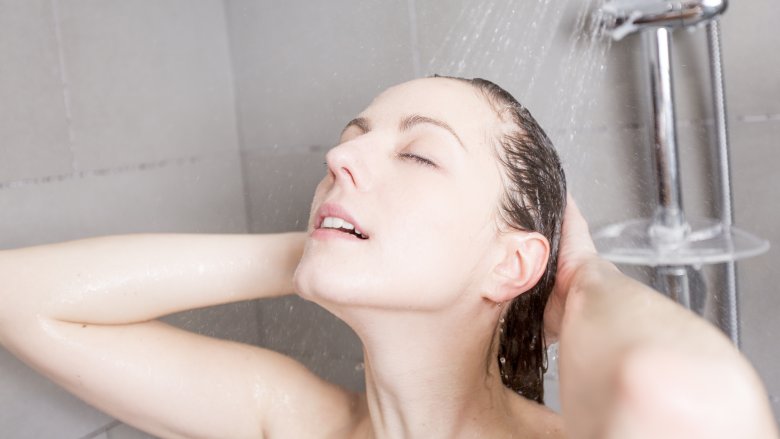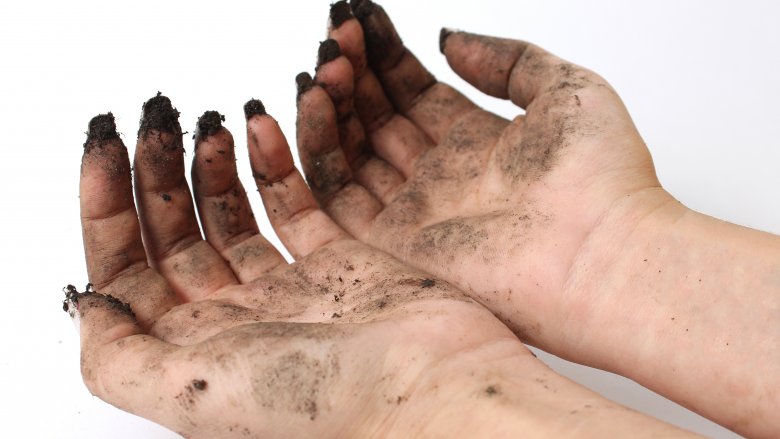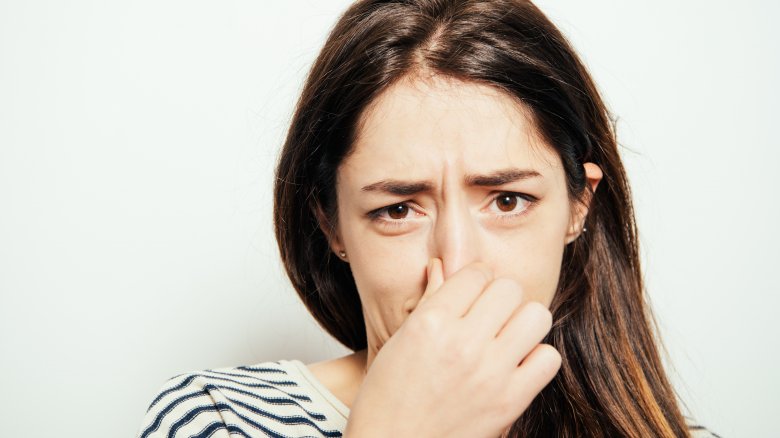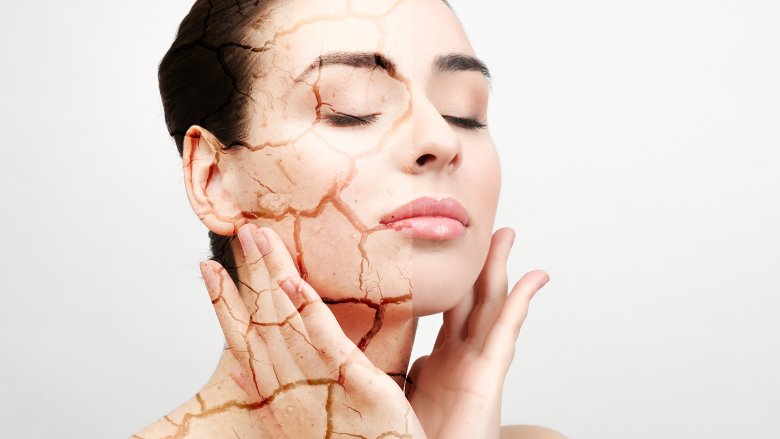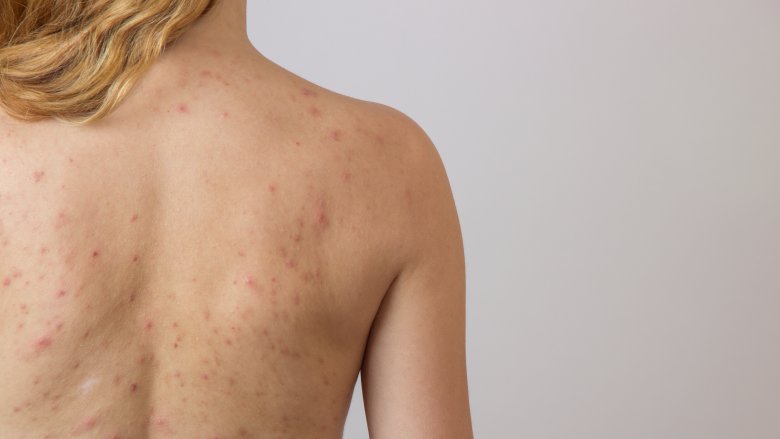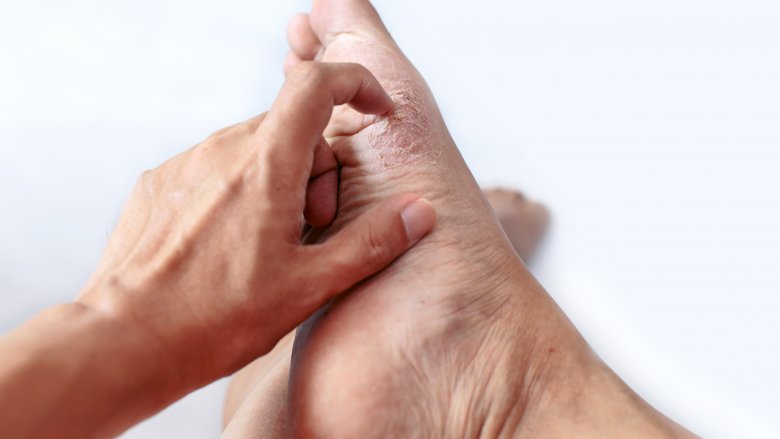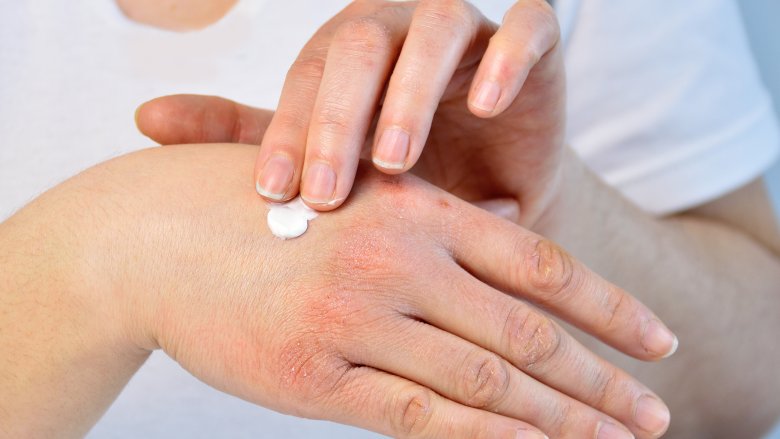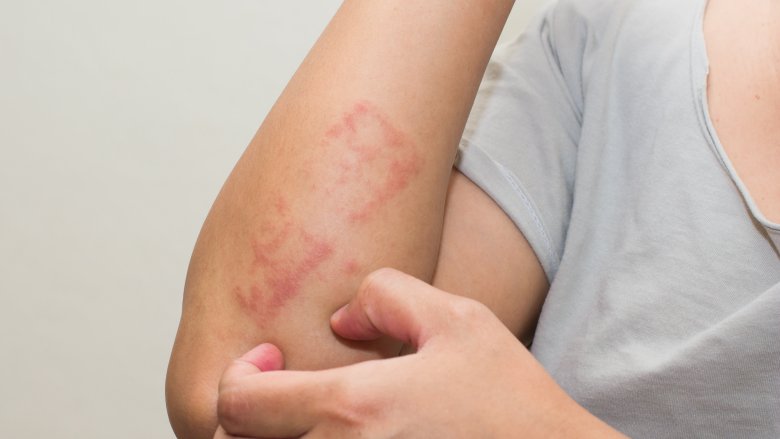What Happens To Your Body When You Stop Showering
Who doesn't love a daily shower — whether it's first thing in the morning, right before bedtime, or both? You wash away the dirt and dust of the day (or night), cleanse and pamper your skin with scented, hydrating, and softening products, and attend to all of your otherwise neglected body parts. It's a self-care ritual and a comforting and relaxing routine that makes you look, smell, and feel good.
But what actually happens to your body when you stop showering? Just like our emotions and amount of exercise can impact our body, it turns out there's also a lot going on with our bodies when we stop showering.
While there are plenty of reasons people may give up showering, such as water conservation or refusing to adhere to societal norms, it can be more problematic than you might think. You don't simply become somewhat gunky and start to smell a little funky. There are plenty of physical changes that take place and can lead to bigger and uncomfortable skin and health issues when you forgo a bath regimen. According to the experts, this is what really happens when you stop showering.
Dead skin cells create a "rich medium for putrid bacteria to grow"
Not showering is no bueno for your body. One of the most negatively impacted areas is the skin itself. If you don't shower regularly, or only do so sparingly, you can expect your skin to react adversely and almost immediately. "The dead cells, sweat, and dust particles stick on to the skin," Dr. Shyam Kalyan N, a general practitioner, told The List. That's a big deal, since this layer of undesirable gunk "forms a rich medium for putrid bacteria to grow and produce foul smell and slimy products."
Sure, plenty of good bacteria use our bodies as hosts, but they are not always visible to the naked eye or nose. When you stop showering, these bacteria don't remain out of sight, out of mind, and out of smell. Sounds pretty gross, right? That's because it is. Dr. Kalyan was also quick to note that you will eventually develop skin and other health issues if you don't make skin hygiene a priority.
You start to smell in unexpected places
This shouldn't come as any sort of shock. Once you stop showering, funky odors will start to build up due to natural and environmental factors. Those aforementioned dead skin cells and bacteria are building up in the various nooks and crannies of your body. If you engage in activities that produce sweat, the problem is compounded.
Dr. Tania Elliott, an internal medicine physician and allergist, told The List, "The more you sweat, the worse it gets, because that creates moisture that bacteria and fungus need to thrive. The areas that are impacted most are under the breasts, arms, groin, and in between the toes. These areas are most prone to become infected with yeast and other fungi." That leads to another byproduct that others around will undoubtedly notice. Elliott elaborated, "You will start to smell within a few days, due to the build up bacteria and fungus on your body."
You may think that you have the perfect solution — pile on the deodorant, scented lotion, or use a metric ton of baby wipes, right? But those can only do so much. Those methods will only end up masking things. Or something totally counterproductive could happen — the smells can become more obvious when you try and cover them up. The last thing you want is to be known for having poor hygiene, right?
Get ready for dry, itchy skin
Dry skin itches. It flakes. It can hurt. It feels all sorts of gross. And if you stop showering, you are in for a brutal bout with dry skin. Dr. David Lortscher, a board-certified dermatologist and founder of Curology, points out that ceasing showering will mess with your previously healthy skin. You will develop rough, dry patches, which indicate that skin is dehydrated.
Slathering on scented oils and lotions can help with scaliness and they can freshen you up temporarily, but these methods are merely masking the problem, rather than addressing or solving it. It is best to "moisturize while the skin is damp after cleansing or showering to 'seal in' some hydration," Lortscher advised.
If you are not showering, that process is negated, and applying product is actually a waste of your precious time. Plus, your body's largest organ will begin to show even further signs of neglect.
The dreaded acne and bacne
As if smelly, dry, and scaly skin weren't bad enough! If you stop showering, chances are you can develop acne in a variety of locations. That includes both chest and back acne aka "bacne."
Lortscher explained that "part of acne development involves excess oil, or sebum, secreted by sebaceous glands into the pores of the skin. These glands are more prominent on our chests and backs, which can explain the prevalence of body acne in these areas." Inflammatory acne is then exacerbated by microorganisms, which "love the oily environment, and our immune system works hard to fight against them via inflammation."
Lortscher also noted that "the microorganisms also love a warm, moist environment, such as the one found on a sweaty back." Since these microorganisms are commonly found on skin, not showering plays right into their hands, so to speak. In layman's terms: Extra oil leads to more bacteria, which leads to more acne!
You can develop jock itch or athlete's foot
If you are a runner or a gym enthusiast, you really don't have the luxury of giving up a shower after rigorous physical tasks. When you do these sorts of things and then decide to curb showering, you can eventually develop something called "tinea cruris." That's more commonly known as "jock itch," and it's just as unpleasant as it sounds. Another, related, condition you may get is "athlete's foot."
These conditions are pretty unpleasant. The infections are spread by scratching or the use of an infected towel, according to Lortscher. "The fungus can grow more abundantly on sweaty skin," Lortscher explained.
Therefore, cleanliness is absolutely paramount so you don't develop these conditions after engaging in exercise or athletic activity. He added, "Showering after physical activity is important to do to avoid this. It is also important to dry the groin area carefully after showering with a separate towel."
You can develop "hard skin"
It isn't just dry, flaky, or smelly skin you have to worry about. If you stop showering, your skin can actually get hard, which is a condition called "retention hyperkeratosis" and mimics a rash.
Dr. Bobby Buka, a board-certified dermatologist, explained this condition is "also known as terra firma, which is Latin for 'hard earth.' All that means is that dead skin, dirt, and the body's natural oils are compacted together forming a sticky, glue-like material on the outermost layer of the skin." He explained that these unpleasant patches can show up on your neck, in the crook of your arm, or on the back of your knees, typically after about a week of not showering.
Buka explained that the name and description sound scarier than they are. "I've had patients come in asking, 'What's this crazy dark rash on my neck?,' totally unsuspecting that dirt is the culprit," he noted. "But then I take an alcohol swab and vigorously rub, and the 'rash' comes right off." Terra firma is also often mistaken for the hyperpigmentation associated with eczema. With eczema, the pigmentation is under the skin. With terra firma, it's on top of the skin.
Exacerbated eczema and other issues
If you already have sensitive skin or suffer from a condition like eczema or the aforementioned acne, not showering can exacerbate said conditions and make them worse, especially during hot and humid months. Lortscher explained, "Eczema can worsen with excess sweating, as can a type of sweat acne called pityrosporum folliculitis."
The good doctor also explained that you can get heat rash or prickly heat, which are "thought to arise from plugging of sweat ducts, which give rise to tiny water bumps. Heat rash occurs especially after repeated episodes of sweating in a hot, humid environment." He suggests taking a cool bath or shower after exercise or strenuous activity to prevent these noxious skin afflictions.
While some experts argue that a daily hot shower can dry out your skin and strip it of natural oils, all of these conditions might make you want to rethink the decision to curtail your showering. As Dr. Buka advised, "While someone might be inclined to skip showers to avoid over-drying and believe it's helping their condition, it can have the reverse adverse effect."
You can get a yeast infection
When you introduce not showering for a prolonged period of time into the equation that is your life, you are putting yourself at a higher risk for all sorts of infections, due to the overgrowth of bacteria on skin. And, yes, a yeast infection is among the possible resulting afflictions.
Yeast infections are fairly common and they are usually pretty easy to rectify. But that doesn't mean they aren't a nuisance and a hassle to deal with. Like many things, prevention is the best cure. "Regular cleansing is especially important in preventing an overgrowth of the bacteria Candida albicans that causes a yeast infection," Buka explained.
While skipping a shower every once in a while is totally your prerogative and giving up on showering for extended periods of time is totally one's own personal choice, a shower a day appears to keep plenty of body and skin conditions away.
